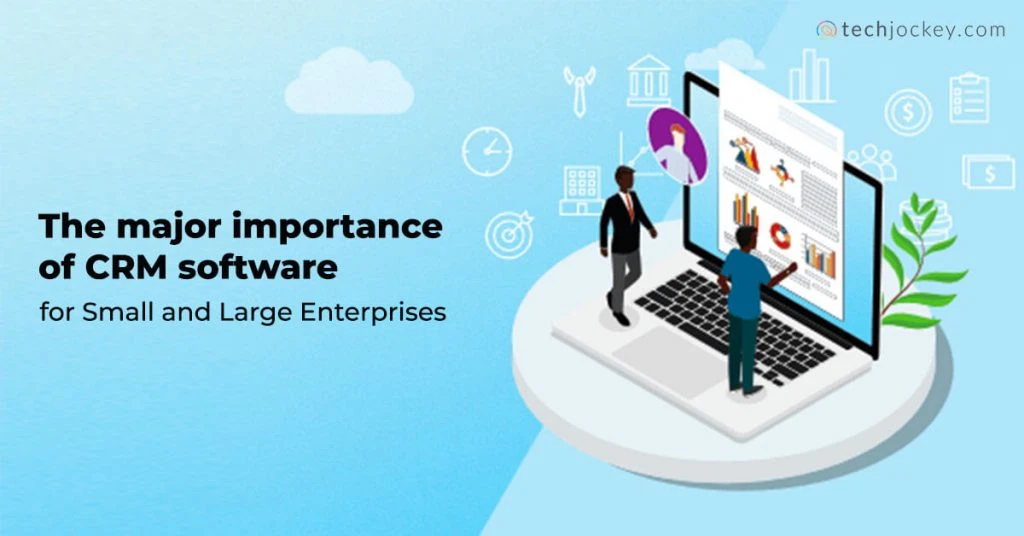Importance of CRM in the Modern Business Environment: Why You Need One

Why CRM is Important?
Customer Relationship Management, shortly known as CRM, is the method or technique utilized by companies to manage their relationship with customers and prospects.
The core purpose of CRM is combining customer data into one entity, streamlining processes, and enhancing business relationships to promote growth and retain customers. CRM enables the company to record all customer interactions and services will be enhanced using gathered data.

In today’s digital and customer-centric world, a CRM system is impossible to do without. Businesses of every size use CRM Software to centralize customer data and enhance productivity through the facilitation of personalized customer experiences.
Especially with the emergence of e-commerce, social media, and digital communication, CRM systems enable companies to understand more profoundly the needs of their customers and respond almost instantly.
Key Functionalities of CRM
Businesses are no longer capable of handling customer management at the most basic level. Innovative functions in modern CRM systems allow organizations to boost sales, increase efficiency, and enhance customer satisfaction. Some of the key features that CRM solutions provide include:
- Predictive Analytics for Strategic Decision-Making: One of the most powerful capabilities of a leading CRM is probably its usage of predictive analytics, especially in the analysis of historical data to predict customer behavior. With this feature, organizations can identify prospective leads and predict churn rates as well as buying patterns. Predictive analytics allow a sales team to focus on high-value clients, thus increasing efficiency while raising conversion rates.
- Real-Time Insights through Dynamic Dashboards: Modern CRM systems offer dynamic dashboards that deliver real-time updates, thus allowing teams to see customer interactions, performance, and market trends immediately. Instant visibility enables the manager to make swift informed decisions based on campaign performance to track performance and optimize resources in real time.
- Automated Customer Segmentation for Personalization: CRM tools can automatically bring customers and segregate them based on behavior, purchase history, or even demographic information. This facilitates businesses in developing hyper-targeted marketing campaigns that resonate much deeper among different types of customer groups. Delivering the right message will lead to engagement and loyalty among customers, which further translates into long-term satisfaction for the company.
- 360 Degree Customer View for Best Service: Most CRM applications share the 360-degree view of each customer by integrating data from every touchpoint, be it sales, support, marketing, or others. These unifications allow teams to resolve issues more quickly, and even customize recommendations for improving customer experience.
- Automated Intelligent Workflow: Contemporary CRMs help automate lengthy processes such as lead nurturing, approval chains, and customer follow-ups. This feature not only provides free time but also ensures the same amount of uniformity so that teams get more time for other productive tasks.
- Omnichannel Communication Management: Today’s CRM integrates other channels of communication, including e-mail, social media, live chat, and SMS in one interface. The omnichannel approach provides a uniform experience irrespective of the channel. It also lets teams switch between channels without work disruption. This thereby reduces response times and enhances customer satisfaction.
- Advance Reporting and Custom Analytics: Each company has its own objectives and KPIs, so true value lies in the implementation of custom analytics tools with a CRM system. Users can easily create custom reports on customer acquisition costs, lead conversion rates, or average response times. This will enable businesses to know where they are going wrong and what specific things have to be implemented to make calculated decisions.
- AI-driven Sales Assistance: The high-end CRM systems provide AI-driven sales assistants that help sales reps by suggesting the next-best actions, optimizing scheduling, and even handling some customer queries. The rationale behind this functionality increases productivity and reduces manual tasks. This allows the sales teams to focus on high-value interactions and close deals more efficiently.
Need of CRM in Real Estate

Real estate agencies require real estate CRM software to better service their customers which include landlords, tenants and vendors. The significance of CRM solutions in such cases lies in timely listing of properties across different real estate and sending out timely reminders to interested buyers. Here we highlight some other factors detailing the importance of CRM in real estate.
Why CRM is Important for Real Estate?
- Moving on from manual entries: The main importance of CRM in real estate lies in the fact that it automates entries of prospective leads. This makes your business more efficient and productive as you can avoid making manual entries in spreadsheets.
- Faster responses to customer queries: Real estate CRM software usually has auto responders which promptly reply to frequently asked queries.
- Engaging with existing clients: Best CRM for real estate agents allow you to engage with your existing clients in an enhanced manner. You can send them emails and newsletters, informing them about your new services and offers.
- Integration with multiple channels: CRM solutions help track customer queries across multiple channels including social media and alerts your sales team once a query is raised.
- Property management: CRM software’s advanced search capabilities help property dealers find suitable houses for different customers from a humongous data pile of available properties.
- Marketing campaigns: Easily create social media and email marketing campaigns and then analyse their performance on key metrics with the help of CRM software.
CRM in Banking Sector

CRM in banking is an important tool for maintaining cordial and productive relations with customers. Banking services are essential for everyone when it comes to managing their finances. It is imperative that people will be gravitated towards institutions which place customer’s best interest at heart. And what can be better than a banking CRM software.
CRM Importance for Banks Explained
- All round assessment of a customer: CRM software in banking integrates well with other banking solutions and keeps a record of each activity of an account holder. This can come handy when the said person applies for a loan and an analysis of their financial habits is required.
- Customer retention: A suitable CRM solution helps deliver personalised banking services to customers right at their doorstep. This includes services such as depositing or withdrawing money, applying for loan and much more.
- Profile updates: The need of CRM arises when significant changes in the profile of a customer has to be made. CRM software puts all information in a single place from where it can be accessed and changed (only by authorized personals).
- Sales and marketing insights: Significance of CRM can be understood from the fact that it provides useful insights related to the success of your promotional campaigns, customer behaviour and scope of improvement.
- Tracking marketing strategies: CRM solutions help banks keep a tab on engagement channels and generate detailed reports for studying customer behaviour.
Importance of CRM in eCommerce

Today e-commerce has become all about reaching out to customers at the right time and creating a unique experience. This approach involves building a robust cross-channel communication to attract new customers and engage with the existing ones.
All this might sound intimidating and indeed is, if done manually. But with retail CRM software, it’s a cakewalk. Read below some of the reasons why CRM is a definite requirement for ecommerce establishments.
CRM in eCommerce: Exactly Why it is Important
- Better shopping experience: CRM in retail business enables customers to keep a tab on their orders, their movement and delivery date, all in real time.
- A single solution for targeted promotions: Retail CRM software helps you study the purchase history of customers and then extend discounts and offers to them.
- Enhanced efficiency of the sales team: With the availability of CRM in eCommerce, sales teams can automate repetitive tasks such as answering customer queries. This leaves them enough time for productive tasks.
- Inventory planning: By using CRM in retail, you can get a know-how of the most popular products and their real time availability in the inventory. This helps you to restock them if their quantity falls below a certain critical level.
- After sales service: The real importance of CRM comes to the fore when you have to cater customer complaints pertaining to specific orders. You can effectively respond to customer grievances through CRM software. Hence in a way, they help build customer loyalty towards your brand.
Importance of CRM in Call Center
CRM importance is truly realized when call center executives have a customer on call and they struggle to retrieve relevant information. A suitable CRM solution helps obtain a comprehensive view of a customer’s previous interaction. The need for CRM software also arises when you want to automate your repetitive tasks and focus more on servicing your clients better.
Importance of Customer Relationship Management Explained
- Centralized Customer Interaction Records: CRM supports centralizing all customer interactions at one location. This facilitates a quick review of previous interactions by the agent, which enables agents to provide a seamless, consistent experience.
- Efficient Call Routing: CRM software using intelligent call routing ensures that incoming calls are routed to appropriate agents with relevant skills and availability. This leads to drastically reduced waiting times and, in turn, lays the stage for faster, more effective service for customers.
- Automated Follow-Ups: CRMs allow for a follow-up process to be automated, scheduling callbacks, and sending reminders so no customer request is ever missed again. They also help agents stay organized so that they can concentrate on high-quality support.
- Enhanced Customer Satisfaction: CRM tools track the customer satisfaction metrics, including how fast calls are resolved. This helps to constantly improve the quality of service at call centers. The agents can also provide personal responses based on data stored about the customers, thus enhancing satisfaction and loyalty.
- For Actionable Performance Insights: CRM gives insights on agent performance, volumes of calls, resolution rates, and feedback from customers. Data-driven insight enables the right optimization of staffing and training thereby enhancing overall efficiency and quality of service
Importance of Customer Relationship Management in Education

Education sector is effectively using CRM tools to improve learning standards and develop better communication between parents and teachers. By using CRM in education, institutions can easily manage the entire parent, teacher and student network. It is also essential for easy management of the admission process by keeping parents abreast of different enrolment stages.
Why CRM is Important in the Education Sector?
- Improved Student Engagement: Education-based CRMs enable an organization to track interactions, preferences, and feedback from its students for appropriate communication. With CRMs, it can create personalized messages aimed at reminding them of deadlines or inviting them to events as well as tailored support to improve engagement and retention.
- Streamlined Admission Process: CRM would help manage student application workflow and track all steps of the admission process while automating follow-ups and returns. It allows schools and universities to centralize applicant data to manage communications and decisions nicely.
- Communication Effectiveness with Parents and Guardians: Through the CRM systems, the school will be able to communicate directly with parents or guardians regarding changes in their child’s academic performance, attendance, and any other events. CRMs ensure that such communication is consistent, on-time, and individualized according to the needs of students, thus fostering healthier relationships between a school and a family.
- Data-Driven Decision-Making: CRMs make available information regarding whether students are engaged, what their current academic progress is, and how well a program is performing to facilitate institutionally informed decision-making. All this data gives potential areas of improvement and programs or services tailored to the needs of the students.
- Better Alumni Relationships: A CRM allows schools and universities to maintain and track alumni relationships. They can monitor any alumni engagement and organize fundraising efforts. Institutions, therefore, are able to convey the information for events, fundraising and networking opportunities to alumni, making them keep good support towards the institutions.
Conclusion
CRM has enabled the business establishment to better their relationships with customers, streamline process mechanisms, and finally make decisions based on data. Contemporary business operations can never be at their best without CRM, and its value will only continue to increase with face-to-face customer-centric strategies by businesses.
Also, for such systems, in the immediate future, there will be further development through AI and machine learning to allow deeper personalization, predictive analytics, and automated responses. Such developments will further improve CRM’s ability to manage customer interactions, which, in the long run, will transform the way businesses relate to their customers.
Namrata is a skilled content writer with an expertise in writing marketing, tech, business-related topics, and more. She has been writing since 2021 and has written several write-ups. With her journey with Techjockey, she has worked on different genres of content like product descriptions, tech articles, alternate pages,... Read more




























